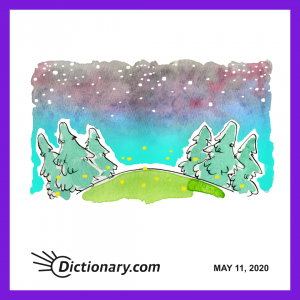Word of the Day
blarney
noun
deceptive or misleading talk; nonsense; hooey: a lot of blarney about why he was broke.
More about blarney
Blarney is named after the Blarney stone, a stone set high up on the outside of the parapet of Blarney Castle, and accessible to a kisser who desires eloquence only if he or she leans backward over the parapet to kiss the stone. There are several stories of the origin of the legend about the stone. One of them involves the goddess Cliodhna, queen of the banshees, to whom Cormac Laidir McCarthy, who built Blarney Castle and became involved in a lawsuit, appealed for assistance. Cliodhna told McCarthy to kiss the first stone he found in the morning on his way to court. McCarthy did as the goddess told him, pleaded his case with great eloquence, and won. Blarney Castle is in the town of Blarney, about five miles northwest of Cork, in southwest Ireland. The name Blarney in Gaelic is (an) Bhlarna “(the) little field,” from blair, blar “field.” Blarney entered English in the 18th century.
how is blarney used?
I am a lawyer and would therefore never mislead you: Blarney is not exactly lies, but it’s not exactly the full truth either.
Perfect love, I suppose, means that a married man and woman never contradict one another, and that they both of them always feel the same thing at the same moment … What blarney!
blarney


cleek
verb (used with object)
to grasp or seize (something) suddenly and eagerly; snatch.
More about cleek
The Scots verb cleek (past tense claucht or claught) “to grasp or seize” comes from Middle English (Northern and Scots) cleke, cleken, a more conservative form than Southern English clechen “to grab, capture.” Both cleke, cleken and clechen come from Old English clyccan “to bend one’s fingers, clench,” the source of Modern English clutch. The Scots noun cleek means “(large) hook (as for hanging a pot over a fire)”; a second sense, from the shape of a cleek, is “arm” (the body part); a third sense, from the second one, “a golf club with an iron head, a narrow face, and little slope, used for shots from a poor lie on the fairway.” The verb cleek entered English in the late 14th century, the noun in the early 15th.
how is cleek used?
Aw’ve sin the’ time when thi’d’n ha’bin cleeked up like lumps o’ gowd.
Archie was just about to cleek him, when he made one terrible rush up water, taking out nearly all my line.
cleek


crepuscular
adjective
of, relating to, or resembling twilight; dim; indistinct.
More about crepuscular
The euphonious adjective crepuscular, “relating to twilight, dim,” is a derivative of the Latin noun crepusculum “(evening) twilight, dusk” (its opposite, “morning twilight, dawn,” is diliculum, very rare but euphonious in its own right). Crepusculum is most likely a derivative of the adjective creper “obscure, doubtful, uncertain,” of obscure, doubtful, uncertain etymology. Crepuscular entered English in the mid-18th century.

how is crepuscular used?
At dusk the full moon began its rise in the crepuscular light and its glowing would last the entire of that night until it set at dawn.
The whisper of his conviction seemed to open before me a vast and uncertain expanse, as of a crepuscular horizon on a plain at dawn—or was it, perchance, at the coming of the night?
Watch crepuscular as the word of the day
crepuscular





